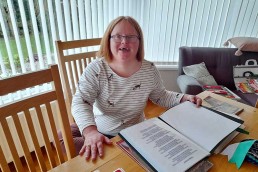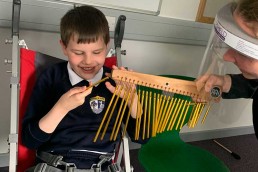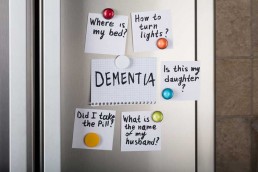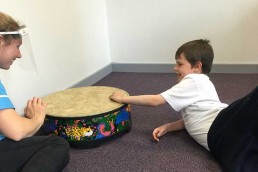SPECIALIST THERAPY SERVICES
Music Therapists are highly trained allied health professionals (AHPs), providing treatment that can help to transform people's lives.
Our music therapists deliver treatment that is tailored to the needs of the service user. This may be in person or remotely, it may be individually or in a group, with or without staff or family present.
When we receive a referral, our therapist will carry out 3 assessment sessions with the client and treatment aims are established and discussed. Where an individual has a multi-disciplinary team involved, we will work jointly with the team to ensure we offer the best service we can to all our clients. After assessment, the minimum number of 10 sessions of music therapy treatment is generally recommended. This has been proven to see the best outcomes and sustainability of skills after the treatment has finished.
All our services, including those detailed below, can be delivered in the home, the venue or in our Music Therapy Hub in Carryduff.

Adults with Disabilities
“….removing the barrier of language”
The main outcomes of music therapy for adults with Learning, Developmental and Physical Disabilities are :
- Communication skills : improving verbal and non-verbal communication through singing, vocalising and instrumental play
- Social skills : developing eye contact, turn taking and interaction through shared music-making
- Cognitive skills : improving focus, shared attention and processing
- Emotional needs : providing a supported and accessible outlet for feelings, developing self-expression and self-esteem
- Physical skills : developing movement and motor skills
“….developing ways of using music to converse with each other, mimicking social interactions outside the therapy room.”
For current prices for individuals or organisations, please contact us.

Autism Spectrum Disorder
“……using his mouth to shape the sounds of the lyrics”
Some of the outcomes of music therapy and Autism Spectrum Disorder are :
- Communication skills : improving verbal and non-verbal communication through singing, vocalising and instrumental play
- Social skills : through shared music-making, developing eye contact, turn taking and interaction
- Cognitive skills : improving focus and shared attention within musical activities
- Emotional needs : providing an alternative outlet for feelings and developing self-expression and self-esteem
- Physical skills : developing movement and motor skills through playing instruments
“….participates in music therapy with a sense of purpose, showing interactive and communicative intent”
For current prices for individuals or organisations, please contact us.

Children and Young People
“….explore issues with self-esteem and foster self-confidence”
The therapist will Identify areas for development and use music and musical activities to achieve outcomes such as :
- Enhanced cognitive skills such as concentration and attention
- Improved emotional state through enhanced self-expression, using music therapy to improve communication via musical improvisation and song-writing
- Increasing appropriate behaviours through the opportunity to safely express and manage negative and destructive emotions and beliefs
- Improved levels of self-confidence and self-esteem
- Enhanced interaction and communication skills, thus improving relationships
For current prices for individuals or organisations, please contact us.

Dementia
“…..singing songs from her era it stimulates memories and conversation”
In dementia care, music therapy can bring benefits in the following areas :
- Psychological and physical support : alleviating pain, anxiety, discomfort, agitation, depression, apathy and loss of self-confidence
- Facilitating self-expression, improving self-esteem and identity, providing emotional support, enhancing mood and quality of life
- Increasing responsiveness, interest, focus and concentration
- Reducing isolation, prompting social inclusion and interactions, strengthening bonds, facilitating communication with others
- Accessing memories, even in people with advanced dementia, enabling them to share these with others in reminiscence, life review and legacy work, including creative recordings
“….creative experience helping exercise new neural networks”
For current prices for individuals or organisations, please contact us.

Mental Health
……”use her voice to express herself through singing songs”
The therapist will help identify areas for development to achieve outcomes such as :
- Improved emotional state through enhanced self-expression, using music therapy to improve communication via musical improvisation and song-writing
- Learning to safely express and manage negative and destructive emotions and beliefs
- Improved levels of self-confidence and self-esteem
- Enhanced interaction and communication skills, thus improving relationships
- Enhanced social skills
- Improved cognitive skills, focus and concentration
“…helped me realise that I deserve to enjoy music again”
For current prices for individuals or organisations, please contact us.

Neuro-disability
“….became more confident as the work continued, speakig more and playing more energeticallly”
For people living with acquired brain injuries or a neuro-degenerative condition, music therapy can be very beneficial and influence functional changes and quality of life. This includes :
- Restorative – using music to regain skills and function, including language and communication skills, concentration, gait balance and control, etc
- Psycho-social-emotional – using music to enable emotional expression, engagement in social interaction and adjustment to disability, as well as to connect with self and others and to ease anxiety and isolation
- Compensatory – using music to compensate for losses ain conjunction with tools such as memory / communication aids
“…smiling and actively engaging”
For current prices for individuals or organisations, please contact us.

Palliative Care
“….choices, thoughts and opinions valued”
In palliative care, music therapy can bring benefits n the following areas :
- Communicative / expressive support : self-expression, acknowledging and supporting mood, emotional regulation and support
- Psychological and physical support : alleviating pain, anxiety, fatigue, discomfort, preparation for loss, improving self-esteem and identity, improving emotional wellbeing and quality of life
- Addressing spiritual and existential needs
- Reducing isolation, promoting social inclusion and interactions, strengthening bonds, facilitating communication
- Legacy and life review work
“….truly himself in a creative and meaningful interaction”
For current prices for individuals or organisations, please contact us.

Special Educational Needs and Disabilities – Children
“…….shrieked with laughter throughout as the sessions offered a wonderful opportunity for them to express themselves”
Some of the outcomes of music therapy for children and young people with special educational needs and disabilities are :
- Communication skills : improving verbal and non-verbal communication through singing, vocalising and instrumental play
- Social skills : through shared music-making, developing eye contact, turn-taking and interaction
- Cognitive skills : improving focus and shared attention within musical activities
- Emotional needs : providing an alternative outlet for feelings and developing self-expression and self-esteem
- Physical skills : developing movement and motor skills through playing instruments
“….incorporated this strong pulse to evoke a physical response”
For current prices for individuals or organisations, please contact us.

Forensic Setting
“It releases my stress and anxiety from everyday life in prison”
Music therapy is able to offer a safe space for creative expression and exploration of;
- Separation
- Isolation
- Loss
- Low self esteem
- Uncooperative attitude
- Low motivation
- Self-harm
“An extremely positive effect on my mental outlook”
For current prices for individuals or organisations, please contact us.
Download our service information
This will give you a more detailed overview of our complete range of services. If you have a requirement for a completely bespoke approach then please feel free to chat with one of our team.
Adults with Disabilities Leaflet
Autism Spectrum Disorder Leaflet
Children and Young People Leaflet
Dementia Leaflet
Mental Health Leaflet
Neuro-disability Leaflet
Palliative Care Leaflet
Special Educational Needs and Disabilities – Children
Services Leaflet
For current prices for individuals or organisations, please contact us.
Making a donation
Every donation is appreciated and will be used to help change the lives of children, young people and adults across Northern Ireland through music therapy.
Thank you!

